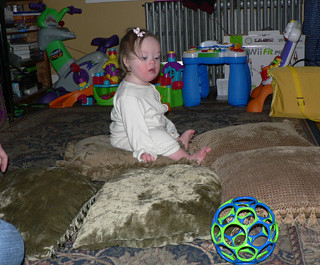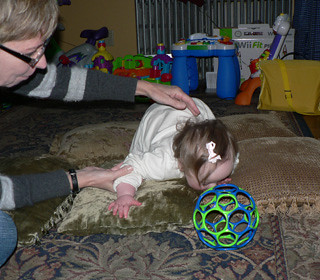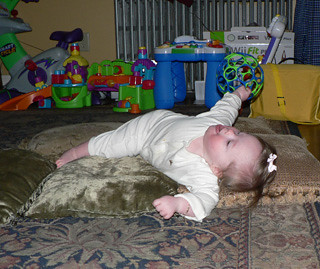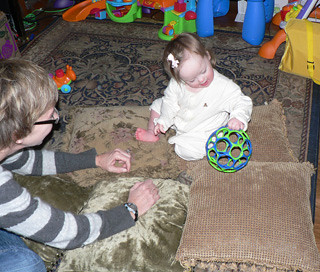"A network of beliefs, processes and practices that produces a particular kind of self and body (the corporeal standard) that is projected as the perfect, species-typical, and therefore essential and fully human. Disability is then cast as a diminished state of being human." - Cambell
By the way, I love that term, species-typical because after all, nobody is normal.
 Where is the line between providing and supporting a child with Down syndrome (or any disability) with opportunities to develop in a healthy way and driving that child toward the species-typical model via therapies, drugs, surgery, and parental pressure? Sometimes I think the line is imaginary and crossing it is simply a matter of semantics and interpretation. Other times I know for sure it is real and I am sad to see it crossed.
Where is the line between providing and supporting a child with Down syndrome (or any disability) with opportunities to develop in a healthy way and driving that child toward the species-typical model via therapies, drugs, surgery, and parental pressure? Sometimes I think the line is imaginary and crossing it is simply a matter of semantics and interpretation. Other times I know for sure it is real and I am sad to see it crossed. At the edges of our communities, we are two camps divided... those that believe most any sort of intervention in the natural development of a child is an attempt to fix perceived deficiencies and those that live to brag about their child’s latest success on the continuum of normal. Is there an agreeable in between? And if our children could see their own futures on both trajectories, and could articulate their desires and fears... what would they tell us about the importance of achievement?
 I have not taken any disabilities studies classes and thus my non-scholarly opinions on this topic are developed from experience with my girls, reading and thinking through the experiences of other parents in the Ds community, and exposure to a more-than-average amount of therapists and therapeutic opportunities... which is my polite way of saying I am just thinking out loud here.
I have not taken any disabilities studies classes and thus my non-scholarly opinions on this topic are developed from experience with my girls, reading and thinking through the experiences of other parents in the Ds community, and exposure to a more-than-average amount of therapists and therapeutic opportunities... which is my polite way of saying I am just thinking out loud here.When Kimani was born I, like most parents of a child with Down syndrome, was sure she was going to be THE Down syndrome rockstar... she was a beautiful infant and extra chromosome or not, she had smart bloodlines... How great she could have been we will never know because at 4 weeks old she contracted bacterial meningitis, and although I did not know it at the time, her gonna-be-a-rockstar days were over.
When we got home from the hospital (Kimani was 4 months old) Early Intervention began and I learned a whole lot about milestones, expectations, and therapy. By nature, I am a "why?" person so everything that was introduced to my daughter as part of her therapy, I questioned. The things that made sense to me, I allowed... the things that didn’t, I declined. What I realized was that some people approach therapy as a way to push children who are different closer to the, here we go with my new favorite term, species-typical model as fast as possible. Other therapies are designed to mitigate motor weaknesses that can lead to potential difficulties and unhealthy habits later on in life.
 For example, Autumn has an aversion to using her right leg and putting weight on her right foot. I could view this as "that’s Autumn, that is the way she was made and being different is ok" or I could see it as something that should be addressed and give her the therapy she requires to correct this so that when she is older she will not have potential arch pain or hip pain due to how her body naturally compensates for this. I chose the therapy. Now if someone told me that they wanted to use Theratogs on Autumn as a way to make her walk at a younger age, I would have said no because I didn’t care when she was going to finally walk on her own... but if the Theratogs will prevent potential hazards for her in the future... like falling down a lot, then heck yeah, we are going to do it.
For example, Autumn has an aversion to using her right leg and putting weight on her right foot. I could view this as "that’s Autumn, that is the way she was made and being different is ok" or I could see it as something that should be addressed and give her the therapy she requires to correct this so that when she is older she will not have potential arch pain or hip pain due to how her body naturally compensates for this. I chose the therapy. Now if someone told me that they wanted to use Theratogs on Autumn as a way to make her walk at a younger age, I would have said no because I didn’t care when she was going to finally walk on her own... but if the Theratogs will prevent potential hazards for her in the future... like falling down a lot, then heck yeah, we are going to do it.I think that most parents of children with disabilities start out (unknowingly) as ableists but grow out of it—in degrees—as their children develop and they realize that being different is ok. The only times that being different needs to be questioned, and addressed, is when it has the potential to cause harm to the child now or in their future.
Childhood is not a race to a perfected version of being human... not for kids with different abilities and not for typical children. It is a time of innocence, joy, learning, and growing. I like it when my friends celebrate those things about their children and my children, as long as the value of the celebration is simply on the child, not on some underlying comparison chart to other children.
 So as with most things, when it comes to ableism and achievement, you need to ask yourself, "Why are we doing this?" If your answer doesn’t fit the definition of ableism, then someday your child will probably be thankful that you did it.
So as with most things, when it comes to ableism and achievement, you need to ask yourself, "Why are we doing this?" If your answer doesn’t fit the definition of ableism, then someday your child will probably be thankful that you did it.





5 comments:
Great post! I loved this blog hop, and in hearing from so many new people on the subject!
I really appreciate your thoughts on this. You're a moderate; I admire that :) I like this, especially:
"Childhood is not a race to a perfected version of being human... not for kids with different abilities and not for typical children. It is a time of innocence, joy, learning, and growing. I like it when my friends celebrate those things about their children and my children, as long as the value of the celebration is simply on the child, not on some underlying comparison chart to other children."
Words to live by. Or at least, to parent by.
I love this statement "Childhood is not a race to a perfected version of being human... not for kids with different abilities and not for typical children."
I feel the same way. Our kids will get there...when they decide to!
What a great common sense approach to Eatly Intervention! It was hard for me to step back enough to ask the "why" question when Jude was young. If I had, I imagine we'd have done less than we did and enjoyed that time more.
I think we are on the same page when it comes to therapy. It's not to change Claire, but to help her be the best Claire. I wasn't looking for her to crawl, walk or speak before anyone else and so our therapy schedule has always been "light" compared to her peers.
Post a Comment
Go ahead, say it.